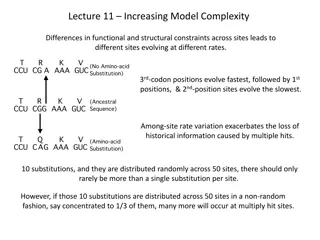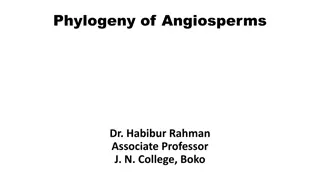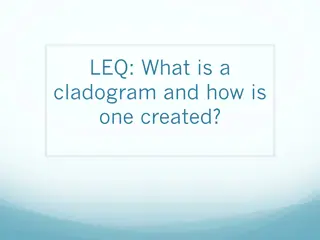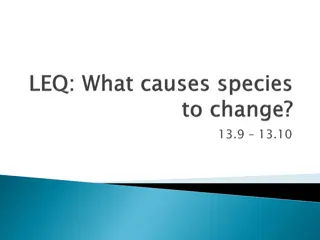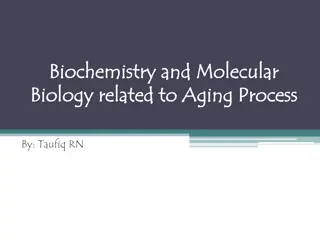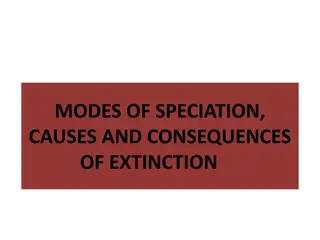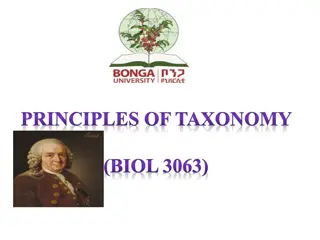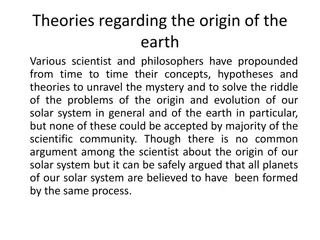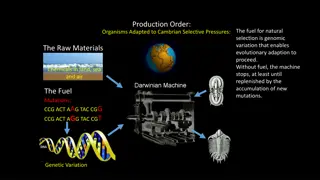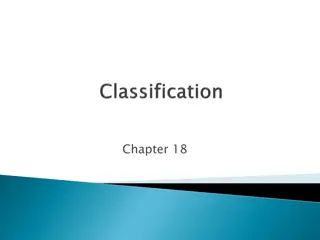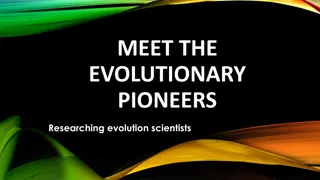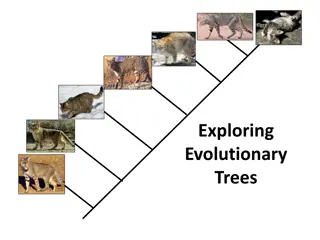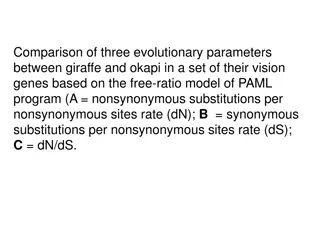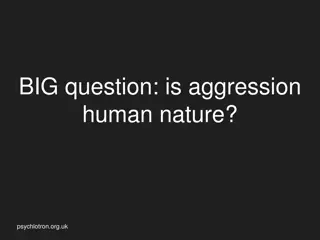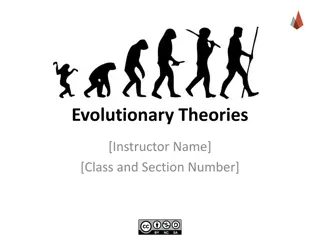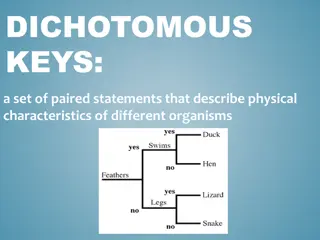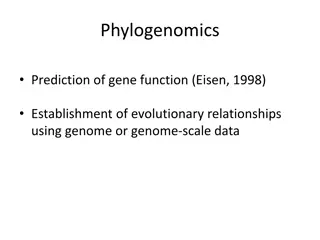Evolution and Plant Systematics Lecture Overview
This lecture outline delves into the concepts of evolution, unity, and diversity of organisms on Earth, covering topics such as fossils, Lamarck and Darwin's theories, adaptation, natural selection, artificial selection, Carolus Linnaeus' systematics, plant evolution, and the demonstration of evolut
4 views • 26 slides
Theories Explaining Deviant Sexual Behavior Throughout History
Explore historical theories on deviant sexual behavior, including demonological, anomie, psychoanalytical, human ecology, and somatotyping theories. These theories range from supernatural beliefs of possession to scientific interpretations of societal influences and individual characteristics.
2 views • 33 slides
Evolutionary Models in Molecular Biology
Differences in functional and structural constraints across sites lead to varying rates of evolution in molecular sequences. Understanding the complexities of site-specific rates, among-site rate variation, site-specific rates models, invariable sites model, and continuous methods is crucial for acc
6 views • 15 slides
Phylogenetic Status of Peripatus: Exploring its Systematic Position
Peripatus, known as claw bearers, exhibits characteristics of both annelids and arthropods, making it an intriguing species in the study of evolutionary biology. Considered as an intermediate link between these two phyla, Peripatus raises questions about its classification and evolutionary history.
0 views • 10 slides
Understanding Phylogeny and Evolution in Angiosperms
Phylogeny is the study of evolutionary relationships among organisms, depicted in phylogenetic trees based on shared characteristics. This overview delves into terms like homology, analogy, monophyly, and co-evolution in angiosperms with an emphasis on taxonomy, systematics, and the evolutionary his
0 views • 25 slides
Understanding Cladograms and Phylogenetic Analysis
Cladograms are used in cladistics to illustrate evolutionary relationships between organisms based on shared ancestral and derived characters. They are created by grouping species by common descent, forming clades that include an ancestral species and all its descendants. Valid clades are monophylet
0 views • 11 slides
Understanding Evolutionary Mechanisms: Natural Selection, Genetic Drift, and Gene Flow
Exploring the forces behind evolutionary change, this content delves into natural selection, genetic drift, and gene flow. Examples such as the bottleneck effect, founder effect, and Amish population polydactylism are presented to illustrate how these mechanisms shape genetic diversity. The impact o
0 views • 14 slides
Understanding Aggression and Violence: Theories and Influences
Exploring the concept of aggression, this content delves into various theories surrounding aggressive behavior, such as the Biological, Frustration, and Learned Social Behavior perspectives. It also touches on influences on aggression like aversive incidents, arousal, and media influence, while prop
1 views • 45 slides
Psychological Theories of Criminality: Understanding the Roots
Psychological theories of criminality delve into the association between intelligence, personality, learning, and criminal behavior. Major theories include Psychodynamic Theory by Freud, Behavioral Theory by Bandura, and Cognitive Theory by Kohlberg. These theories explore how unconscious mental pro
1 views • 20 slides
Exploring Leadership Theories: Traits and Behaviors
Leadership theories have evolved from trait theory focusing on personal qualities to behavioral theories emphasizing actions and interactions. While early research sought universal traits for leadership, it encountered challenges due to varied traits among leaders and non-leaders. Behavioral theorie
2 views • 29 slides
Unraveling COVID-19 Conspiracy Theories and Hoaxes
Exploring various conspiracy theories surrounding the origins of COVID-19, from bat soup to bioweapons and espionage. Dive into wilder theories involving population control, world war, and even Disney's supposed predictions. Understand the differences between conspiracy theories and hoaxes, shedding
2 views • 11 slides
Understanding Aging Process from a Biochemical Perspective
Biochemistry and Molecular Biology play crucial roles in understanding the aging process, focusing on the biochemical basis of life, the basis of health, major causes of diseases, and theories of aging. Aging is described as the accumulation of damage due to reactive oxygen species, with theories en
2 views • 11 slides
Evolutionary Insights of Basidiomycota Dikaryons
Basidiomycota, a successful fungal group with 30,000 known species, predominantly exhibits filamentous vegetative growth while also producing yeast forms. The multi-layered cell wall and regularly septate hyphae with dikaryotic mycelium are key characteristics. Recent experimentation on Schizophyllu
0 views • 20 slides
Understanding Speciation and Extinction in Evolutionary Biology
Explore the modes of speciation and causes of extinction in the evolutionary process. Learn how species evolve to become distinct through geographic isolation and reduced gene flow. Understand the implications of extinction and its impact on biodiversity. Images and descriptions provided offer insig
0 views • 33 slides
Fundamentals of Taxonomy Explained: From Classification to Nomenclature
Taxonomy, derived from Greek roots, encompasses the science of classifying organisms and understanding their variations, evolutionary relationships, and naming conventions. It involves description, identification, classification, and nomenclature of both living and extinct organisms. The practices o
1 views • 39 slides
Theories on the Origin of Earth and Solar System
Scientists and philosophers have proposed various theories regarding the origin of Earth and our solar system, with concepts ranging from evolutionary to catastrophic. The Dust gas cloud theory, Planetesimal hypothesis, Binary star hypothesis, and more have been suggested to explain how planets were
4 views • 7 slides
Understanding Sociological Theories and Frameworks
Sociological theories, encompassing micro and macro perspectives, provide a lens to interpret societal dynamics. Consensus theories like functionalism emphasize shared norms, while conflict theories such as Marxism highlight social inequalities. Social action theories like interactionism focus on in
3 views • 21 slides
Online Seminar: Theories of Learning in Initial Teacher Education
This collection of online seminar slides introduces pre-service teachers to major theories of learning, including the Science of Learning through cognitive neuroscience. The presentation aims to help educators consider implications for teaching, recognize theories in action, and pose critical questi
1 views • 11 slides
Insights into Evolutionary Adaptation and Genetic Variation
The production order highlights the essential role of genomic variation as fuel for natural selection, driving evolutionary adaptation. The Cambrian Explosion timeframe reveals a rapid increase in evolutionary adaptation, showcasing the appearance of diverse animal phyla over a relatively short peri
5 views • 6 slides
Theories of Causation in Psychological and Social Sciences
Overview of theories of causation categorized into psychological, social psychological, and sociological perspectives. Psychological theories focus on instinctive, biological, and psychological qualities of abusers, including Attachment Theory, Psychodynamic Theory, Social Learning Theory, and Situa
0 views • 15 slides
Introduction to Quantum Chromodynamics & Field Theories in High-Energy Physics
Explore the fundamentals of Quantum Chromodynamics and Classical Field Theories in this informative lecture, covering topics such as global and local symmetries, Lagrangians, actions, and dynamics. Understand the significance of global and local symmetries in classical field theories, along with exa
2 views • 17 slides
Comprehensive Overview of Student Affairs Theories
This collection explores key theories in student affairs, including cognitive-structural theories, learning theories, and person-environment theories. Cognitive-structural theories delve into how individuals process information, while learning theories examine how people absorb knowledge. Person-env
3 views • 19 slides
Understanding Theories and Concepts in Research
The content delves into the fundamental concepts of theories and variables in research. It discusses the nature of theories, including descriptive, explanatory, and predictive theories. Additionally, it examines the role of concepts in providing identity and meaning to objects and phenomena. Through
1 views • 55 slides
Classical Trade Theories and Their Limitations in International Economics
Classical trade theories such as the Theory of Absolute Advantage by Adam Smith and the Theory of Comparative Advantage by David Ricardo highlight the benefits of free trade and specialization based on natural advantages. However, these theories have limitations, such as the inability to explain sce
0 views • 8 slides
Applying Theories and Models in Integrated Health: Module 3 Overview
This module delves into the application of various theories, perspectives, and practice models in integrated healthcare. Students will learn to utilize different theories to enhance their understanding and practice in integrated health, focusing on aspects like personal impact, behavioral change the
0 views • 78 slides
Computing Triplet and Quartet Distances Between Evolutionary Trees
Study on computing triplet and quartet distances in evolutionary trees, comparing rooted vs. unrooted, binary vs. arbitrary degree trees. Discusses algorithms, experimental results, and evolutionary tree construction methods. Includes analysis on cultural phylogenetics and evolutionary tree comparis
0 views • 27 slides
Evolutionary Dynamics in Signaling Games and Strategies
Explore the intricate dynamics of signaling games and evolutionary strategies like Lewis signaling games, Hamilton Maynard Smith theories, and replicator dynamics. Witness the evolution of signaling strategies through simulations and understand the role of replicator dynamics in population interacti
1 views • 50 slides
Understanding Taxonomy and Classification in Biology
Scientists use classification to group organisms logically, making it easier to study life's diversity. Taxonomy assigns universally accepted names to organisms using binomial nomenclature. Carolus Linnaeus developed this system, organizing organisms into species, genus, family, order, class, phylum
0 views • 11 slides
Evolutionary Pioneers: Anning, Darwin, Wallace - Key Figures in Evolutionary Theory
Meet the evolutionary pioneers - Mary Anning, Charles Darwin, and Alfred Russel Wallace, who played crucial roles in the development of evolutionary theory. Learn about their groundbreaking discoveries, challenges faced, and lasting impact on the scientific community.
0 views • 7 slides
Exploring Evolutionary Trees and Family Lineages
Dive into the world of evolutionary trees and family lineages through captivating visuals and informative illustrations. Explore the relationships between species, understand genetic connections, and discover how traits evolve and spread through generations. From evolutionary history to family trees
0 views • 25 slides
Accelerating Lemma Learning Using Joins in Satisfiability Modulo Theories
Explore the use of joins in accelerating lemma learning within the context of Satisfiability Modulo Theories (SMT). The study covers various SMT applications at Microsoft and delves into the development of the Z3 solver. Key topics include theories, arithmetic operations, array theory, uninterpreted
0 views • 25 slides
Comparative Analysis of Evolutionary Parameters in Giraffe and Okapi Vision Genes
This presentation compares three evolutionary parameters (dN, dS, dN/dS) between giraffe and okapi in a set of vision genes using the free-ratio model of the PAML program. The images illustrate the differences in nonsynonymous and synonymous substitutions, as well as the ratio of nonsynonymous to sy
0 views • 4 slides
Understanding Aggression: Exploring Its Evolutionary Roots
Delve into the complexities of human aggression, questioning whether it is inherent or a learned behavior. Explore evolutionary theories and biological perspectives on the causes of aggression, examining how factors such as genetics, brain structures, hormones, and environmental pressures may influe
0 views • 11 slides
Understanding Evolutionary Theories and Strategies
Exploring evolutionary theories such as Sexual Selection Theory and Gene Selection Theory sheds light on how characteristics evolve for mating advantage. Insights into intersexual and intrasexual competition offer a deeper understanding of mate selection preferences. Gene selection mechanisms influe
0 views • 20 slides
Exploring Human Origins Through Hominid Fossils and Evolutionary Traits
Delve into the fascinating world of human origins, examining hominid fossils, anatomical traits, and evolutionary evidence. Learn about early species like Ardipithecus ramidus, differentiate African apes from modern humans, and analyze the genetic lineage supporting human evolution. Explore tables,
0 views • 14 slides
Theories and Concepts in Semantics: Classical vs. Prototype Approaches
Explore different theories of concepts in semantics, including classical theories based on necessary and sufficient conditions, causal theories, and prototype theories. Compare their strengths and limitations in handling fuzziness, asymmetry, and internal structure of concepts. Discover how experime
0 views • 46 slides
Integrating Theories and Models for Enhanced Health Practice
Explore the application of theories, perspectives, and practice models in integrated health through Module 3. Learn how theories guide assessment, treatment, and patient outcomes. Discover common theories enhancing assessment and supporting individuals through grief and loss. Gain insights into the
0 views • 78 slides
Comprehensive Overview of Leadership Theories and Styles
Leadership encompasses the ability to influence a group towards achieving goals by knowing oneself, communicating vision, building trust, and taking effective action. Various leadership styles include Autocratic, Democratic, Free-Rein, and Paternalistic, each with distinct decision-making approaches
0 views • 19 slides
Understanding Dichotomous Keys and Cladograms in Evolutionary Biology
Dichotomous keys are utilized to classify different organisms based on their physical characteristics, while cladograms depict evolutionary relationships. Derived traits play a crucial role in understanding evolutionary history, indicating features present in later organisms but not earlier ones. Pr
0 views • 16 slides
Understanding Phylogenomics and Gene Function Prediction in Evolutionary Biology
Explore the significance of phylogenomics in predicting gene functions and establishing evolutionary relationships using genome-scale data. Learn about the challenges of using single genes or a few genes in phylogenetic analysis, the importance of analyzing multilocus data, and the need for multiple
0 views • 24 slides


